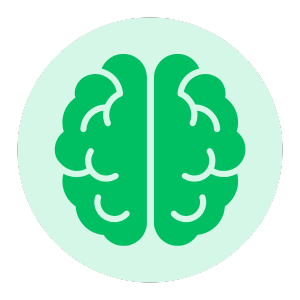Anxiety Assessment Tool
Evaluate anxiety patterns and identify potential anxiety traits
This self-assessment helps identify potential symptoms associated with anxiety disorders. Please select the category that best describes you to begin the evaluation.
Male
Anxiety assessment for adult males
Female
Anxiety assessment for adult females
Child
Anxiety assessment for children
Results are not a diagnosis - consult a healthcare professional for evaluation. © 2025
Anxiety Assessment Results
Based on your responses, here is your anxiety profile
Key Characteristics
- Empathy towards others
- Awareness of surroundings
- Vigilance in important tasks
- Thoughtful decision-making
- Excessive worry
- Restlessness or feeling on edge
- Difficulty concentrating
- Physical symptoms (muscle tension, headaches)
Management Strategies
- Practice mindfulness and relaxation techniques
- Maintain a regular exercise routine
- Break tasks into smaller steps
- Monitor and challenge anxious thoughts
- Cognitive Behavioral Therapy (CBT)
- Anxiety management groups
- Medication evaluation
- Support from trusted people
Recommended Resources
- Anxiety and Depression Association of America (ADAA)
adaa.org | Education, resources, and support - Mental Health America
mhanational.org | Self-help and professional resources - National Institute of Mental Health
nimh.nih.gov | Research and info on anxiety
Understanding Anxiety: Symptoms, Management, and Coping Strategies
Comprehensive information about anxiety disorders, treatment options, and daily management techniques
Anxiety disorders affect millions worldwide, manifesting in various forms from generalized anxiety to specific phobias. Understanding anxiety symptoms, treatment options like cognitive behavioral therapy for general anxiety disorder, and coping mechanisms is essential for effective management. This comprehensive guide explores anxiety from multiple perspectives, including medical treatments, therapeutic approaches, and spiritual resources like bible verses for anxiety.
Recognizing Anxiety Symptoms and Types
Anxiety manifests differently across individuals, with symptoms ranging from psychological worries to physical manifestations like chest tightness anxiety and anxiety headache. Understanding these symptoms is the first step toward effective management. Medical professionals use diagnostic codes like icd 10 code for anxiety to classify and treat different anxiety disorders appropriately.
Physical Symptoms of Anxiety
Many people experience physical symptoms including dizziness, gastrointestinal issues, muscle tension, and respiratory changes. Questions like "does anxiety cause dizziness" or "can anxiety cause headaches" are common among those experiencing anxiety for the first time. These physical manifestations often lead people to seek medical attention before recognizing the underlying anxiety component.
Types of Anxiety Disorders
Anxiety disorders encompass several conditions including generalized anxiety disorder (GAD), social anxiety, panic disorder, and specific phobias. Each has distinct characteristics but shares the common thread of excessive, persistent worry and fear. Understanding the differences helps in seeking appropriate treatment, whether that's cognitive behavioral therapy for general anxiety disorder or medication management.
Treatment Options for Anxiety
Effective anxiety treatment typically involves a multifaceted approach including therapy, medication, and lifestyle changes. From anxiety medication online services to in-person therapy, numerous options exist for those seeking relief from anxiety symptoms.
Therapeutic Approaches
Cognitive behavioral therapy for general anxiety disorder is considered the gold standard psychological treatment. Other approaches include acceptance and commitment therapy (ACT), dialectical behavior therapy (DBT), and solution focused therapy. For those with relationship concerns, therapists for relationship anxiety specialize in addressing interpersonal aspects of anxiety.
Medication Management
Medications like SSRIs (e.g., Zoloft), SNRIs, benzodiazepines, and beta-blockers like propranolol for anxiety are commonly prescribed. Determining the right propranolol dosage for anxiety or best time of day to take zoloft for anxiety requires working with a knowledgeable prescriber. Some explore alternatives like cbd vape pens for anxiety or ashwagandha, though evidence varies for these approaches.
Did You Know?
Anxiety disorders are among the most common mental health conditions worldwide, affecting approximately 1 in 5 adults. Research shows that combination treatment approaches (therapy and medication) typically yield better outcomes than either approach alone. Early intervention can significantly improve long-term management of anxiety symptoms.
Spiritual and Alternative Approaches
Many find comfort in spiritual resources when managing anxiety. Bible verses for anxiety, prayer for anxiety, and other faith-based practices provide solace for those with religious affiliations. These approaches often complement rather than replace evidence-based treatments.
Biblical Resources for Anxiety
Scriptures like bible verses about anxiety and fear offer comfort to many believers. Verses such as Philippians 4:6-7 ("Do not be anxious about anything...") and 1 Peter 5:7 ("Cast all your anxiety on him...") are frequently referenced. Some create anxiety tattoos with meaningful scriptural references as permanent reminders of their faith during difficult times.
Alternative and Complementary Approaches
Beyond traditional treatments, many explore alternatives like crystals for anxiety, meditation for anxiety and sleep, and binaural beats anxiety reduction techniques. While evidence for some alternatives is limited, they may provide supplementary benefits when used alongside conventional treatments.
Living with Anxiety: Daily Management Strategies
Effective anxiety management extends beyond clinical treatments to daily coping strategies. From practical tools like anxiety rings and weighted hoodie for anxiety to lifestyle adjustments, numerous approaches can help manage symptoms day-to-day.
Workplace Accommodations
Those with significant anxiety may wonder can you get disability for anxiety or seek 504 accommodations for anxiety in educational settings. Understanding rights and available accommodations is crucial for functioning in work and academic environments. Some explore jobs for people with anxiety that align with their symptoms and strengths.
Social and Relationship Aspects
Anxiety often impacts relationships, leading some to seek therapists for relationship anxiety. Understanding how anxiety manifests interpersonally helps maintain healthy connections while managing symptoms. Some find comfort in community through shared experiences like anxiety memes that humorously depict common struggles.
Finding Your Path to Anxiety Management
Anxiety management is highly individual, with different approaches working for different people. Whether through clinical treatment like cognitive behavioral therapy for general anxiety disorder, medication management exploring propranolol for anxiety dose options, spiritual resources like bible verses for anxiety, or daily coping strategies, numerous paths exist toward better anxiety management.
If you're struggling with anxiety, remember that help is available. Consider consulting with a healthcare provider about diagnosis and treatment options, exploring therapeutic resources, and developing a personalized management plan that addresses your specific needs and circumstances.
